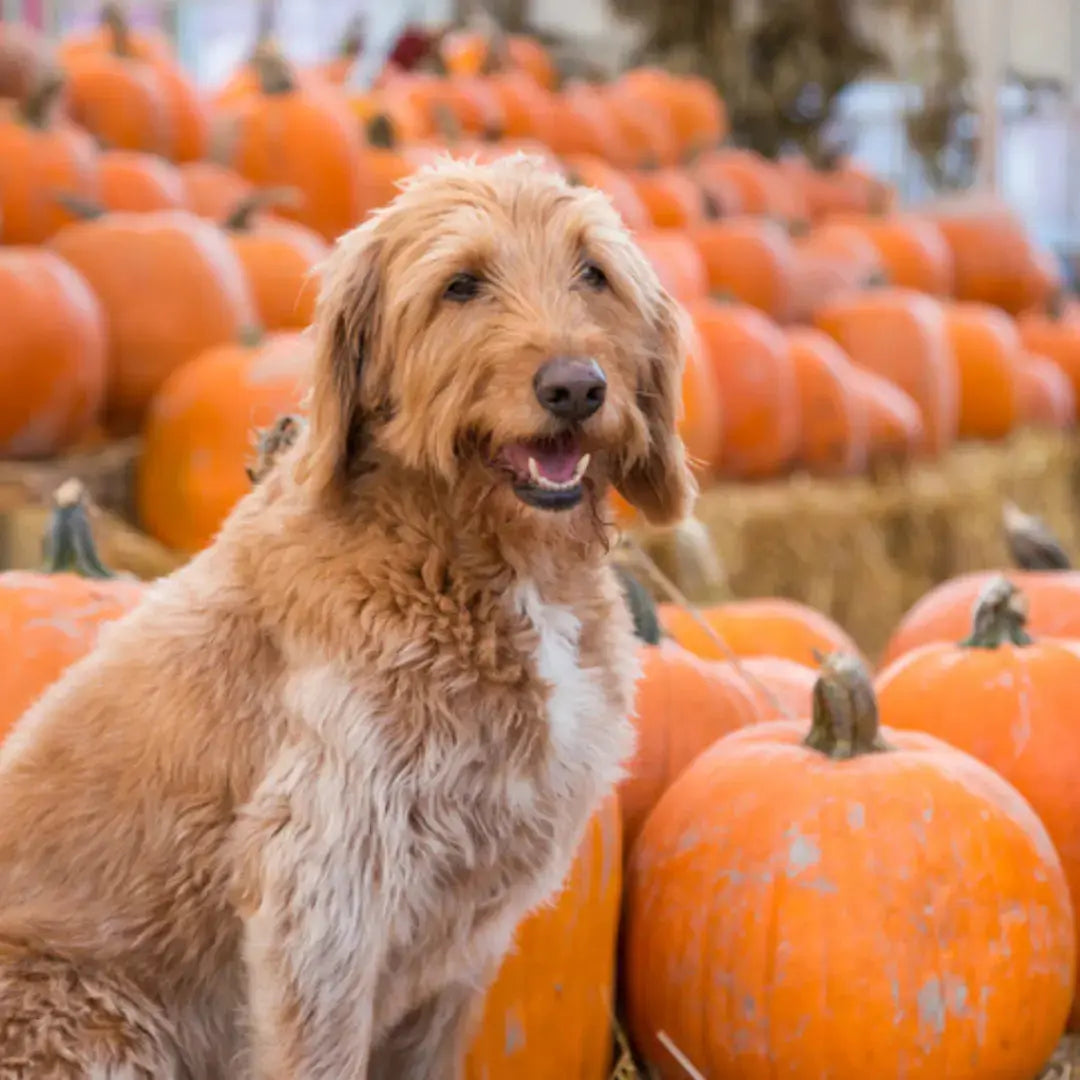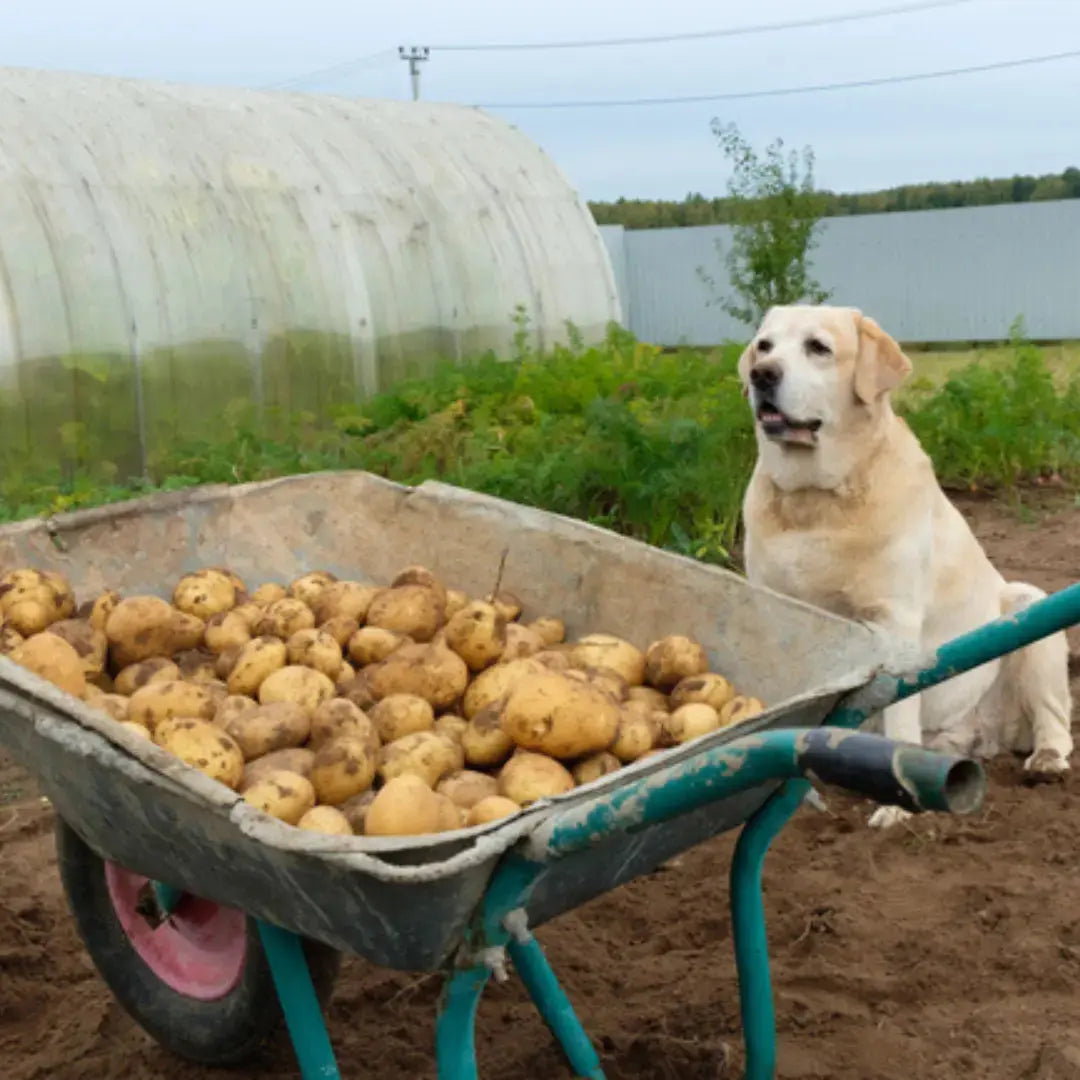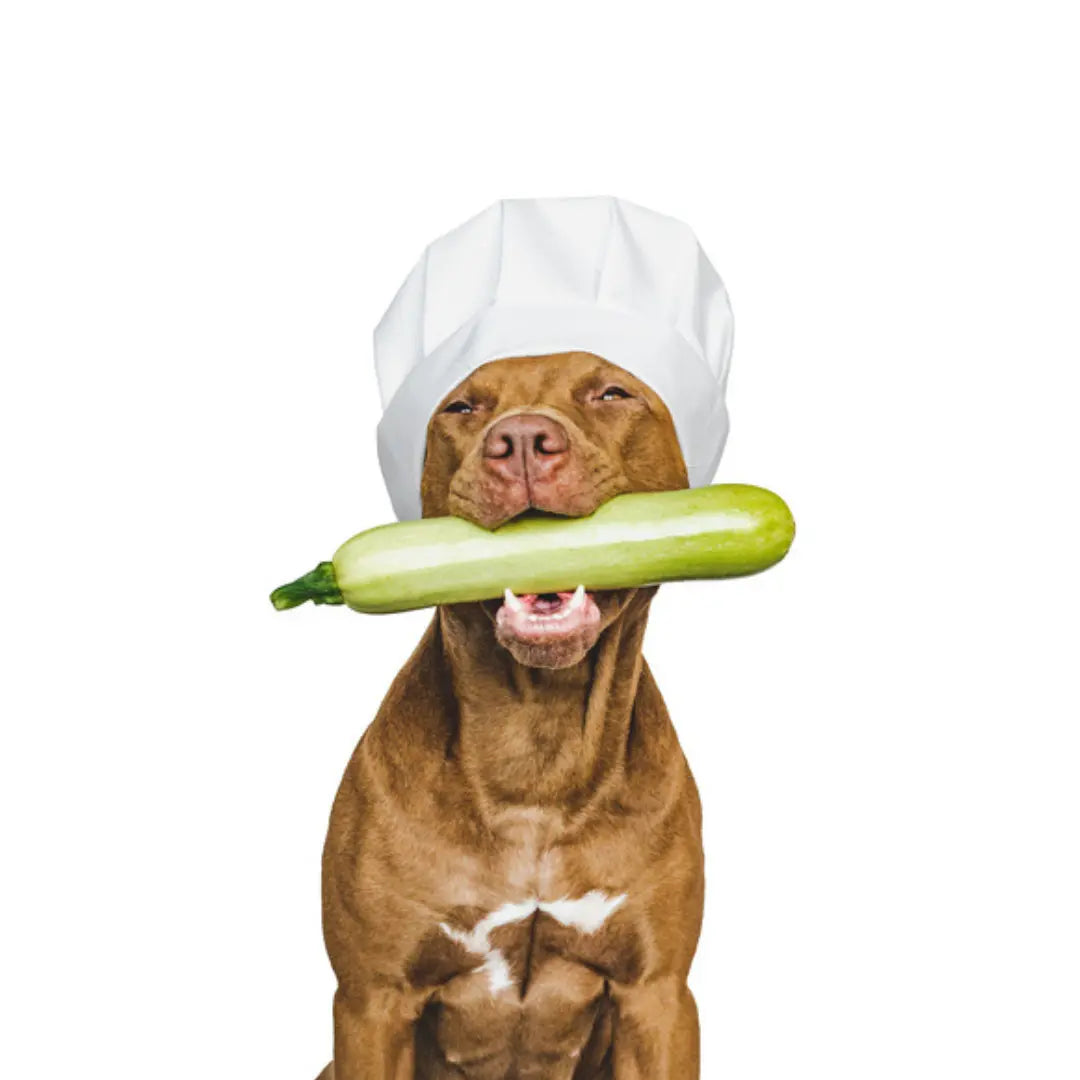Feeding Pumpkin to Your Dog : Can Dogs Eat Pumpkin?
As a pet parent, you love adding delicious new foods to your dog's meals. And while you may have heard about feeding your dog pumpkin, you may not be entirely sure about whether it's safe or beneficial. As the fall season and Halloween quickly approaches, we will cover all you need to know about feeding pumpkin to your dog, the benefits, do's, don'ts, pumpkin recipes, the nutrient content, the kinds of pumpkin you can give your dog, and more frequently asked questions.
Benefits of Pumpkin - Is Pumpkin Good for Dogs?
Yes! Pumpkin is a superfood and can be a nutritious addition to your dog's diet when served properly and in moderation. High in dietary fibre, pumpkin can support your dog's digestive health, helping to regulate their bowel movements. Furthermore, it's packed with essential nutrients like Vitamins A and E, and minerals such as iron, beta-carotene and potassium. These nutrients can boost your dog's immune system, promote eye health, keep them healthy, and their coat shiny. Pumpkin is low in calories, making it a perfect treat option for dogs who are prone to weight gain.
Do's and Don'ts of Feeding Your Dog Pumpkin:
When feeding your dog pumpkin, it is essential to keep a few things in mind. First, pumpkin should never be a substitute for a healthy and well-balanced diet. Secondly, pumpkin should be introduced slowly into your dog's diet to avoid any digestive issues. Start with small amounts of pumpkin, and if your dog seems to tolerate it well, you can increase the amounts gradually.
How much Pumpkin to Feed?
Pumpkin should not exceed 10% of your dog's daily food intake. So use it as a treat topper or in your dog's homemade meals.
Nutrient Content of Pumpkin:
Pumpkin is packed with nutrients that are essential to your dog's health. One cup of cooked pumpkin contains around 30 calories, which is an adequate amount for adding to your dog's diet. Pumpkin is high in fibre and contains vitamin A, vitamin C, vitamin E, vitamin K, and beta-carotene. It is also an excellent source of potassium, iron, magnesium, and calcium. The combination of these nutrients makes pumpkin beneficial for your dog's skin, immune system, vision, and digestive health. Let’s dive deeper into the details:
- Pumpkin May Supports Digestive Health - Pumpkin is an excellent source of fibre which plays a crucial role in promoting proper digestion. Fibre helps regulate bowel movements, preventing constipation, and supporting healthy bowel function. Adding a small amount of plain canned pumpkin to your dog's diet can alleviate digestive issues and help keep their digestive tract healthy.
- Pumpkin May Aid in Weight Management - Obesity is a common issue for dogs and can lead to various health problems. However, a moderate amount of pumpkin added to their meals can help them feel fuller for longer, reducing their overall calorie intake. Additionally, pumpkin is low in calories, so it's an excellent addition to your dog's diet if they need to lose weight.
- Pumpkin May Support Immune Function - Pumpkin is packed with vitamins and minerals like vitamin A, potassium, and iron, all of which play a crucial role in supporting your dog's immune system. The antioxidants found in pumpkin also help prevent cellular damage and inflammation, potentially reducing the risk of chronic diseases. Pumpkins also act as a beneficial prebiotic for your dog. A prebiotic is a type of dietary fibre that feeds friendly bacteria, or probiotics, in the gut, helping them to flourish. Pumpkin is a rich source of dietary fibre, which can nourish these beneficial gut bacteria, contributing to a healthy gut microbiome. A balanced gut biome plays a crucial role in a dog's overall health, aiding in digestion and boosting the immune system.
- Pumpkin May Promote Healthy Skin and Coat - The vitamin A found in pumpkin is essential for maintaining healthy skin and coat. It can help reduce skin irritations like itching and dryness and promote shiny, lustrous fur.
- Pumpkin May Aid Your Dog's Weak Bladder - pumpkin can also be beneficial for dogs with urinary incontinence or weakened bladder. The high water content in pumpkins can help dilute urine and reduce the concentration of minerals that can lead to the formation of bladder stones. Furthermore, the antioxidants in pumpkin can help reduce inflammation in the bladder and other parts of the urinary system.
Kinds of Pumpkin to Feed Your Dog:
There are several varieties of pumpkin, and not all can be given to your dog. The pumpkin type that is safe for your dog is the Cucurbita Pepo species, also known as the sugar pumpkin, which is commonly used for making pumpkin pies. The second is the Dickinson pumpkin, which typically has a milder flavour, less moisture, and is commonly used for pumpkin puree. However, avoid giving your dog ornamental pumpkin, as they are not suitable for consumption.
Is Canned Pumpkin safe for my dog?
It's important to note that not all canned pumpkin is the same. Commercially canned pumpkin, which is made from 100% pure pumpkin, is safe for dogs to eat. On the other hand, pumpkin pie filling, which contains added sugars, spices, and other ingredients, should be avoided. So, if you want to give your dog canned pumpkin, make sure that it's the unsweetened pure pumpkin variety.
Pumpkin Preparation for Dogs
Before you add pumpkin to your dog's bowl, it's essential to know the proper preparation methods. First, make sure you're buying plain, canned, unsweetened, and un-spiced pumpkin. Avoid any human food such as pumpkin pie fillings or anything that contains sugar, spices, or additives. Next, it's crucial to feed your dog only cooked or canned pumpkin. Never feed your dog raw pumpkin since it can be challenging to digest and may cause gastrointestinal issues. Roasting or baking pumpkin is an excellent way to enhance its flavour and texture for your dog.
Feeding Pumpkin to Your Dog
Pumpkin is versatile, and you can easily incorporate it into your dog's diet. Some dog owners use pumpkin to supplement their dog's meals and add a few tablespoons to their regular dog food. Others use pumpkin as a low-calorie dog treat for snack time. You can also freeze pureed pumpkin in ice cube trays and use it as a refreshing snack on hot summer days.
Pumpkin Recipes for Dogs:
Pumpkin is a versatile ingredient that can be included in many different dog-friendly recipes including dog treats or full homemade dog meals. Here are a few of our Dog Child pumpkin recipes to try out:
Pumpkin Cheesecake Lick Mat for Dogs
Ground Beef & Egg Meal with Pumpkin
Dog Child Mixed Veggie Meal Mix For Dogs
If you’re looking for a quick and nutritious way to add veggies - specifically pumpkin to your dog’s diet then Dog Child’s Mixed Veggie Meal Mix is perfect. Filled with nutritious vegetables such as sweet potato, broccoli, pumpkin, kale, and parsley, you simply rehydrate with water and mix in with your dog’s ground protein of choice - voila you have a homemade meal for your dog. You can either use a complete and balanced meal or mix it into your dog’s regular food as a topper. Get your paws on one of our Meal Mixes today.
Mixed Veggie Meal Mix for Dogs

Pumpkin Allergies and Sensitivities
While pumpkin is generally safe for dogs, some canines may be allergic or sensitive to the ingredient. If you notice any symptoms such as itching, rashes, or vomiting after feeding your dog pumpkin, discontinue use immediately.
Pumpkin and Dietary Fibre
Adding pumpkin to your dog's diet can provide essential dietary fibre that promotes healthy digestion. Fibres help food move through your dog's digestive system, reducing the risk of constipation or other gastrointestinal issues. Dietary fibre can also lower cholesterol levels, improve your dog's blood sugar regulation, and keep your dog's weight in check.
Pumpkin and Weight Management
If your dog is overweight, incorporating pumpkin into their diet may help them lose weight. Pumpkin is low in calories, yet high in fibre, which can keep your dog feeling full, reducing their overall caloric intake. However, pumpkin shouldn't replace your dog's traditional meal; it should only be used as a supplement.
Pumpkin as a Natural Doggy Laxative
Pumpkin can also act as a natural laxative for dogs suffering from constipation. Due to its high fibre content, pumpkin can help absorb water and improve stool quality, making bowel movement more comfortable. It's important to note that pumpkin isn't a hermetical cure for constipation, and severe cases should always be treated by a veterinarian.
FAQ
How do you cook a whole pumpkin?
We made a simple recipe to teach you how to cook a whole pumpkin for your dog using this oven method. Check it out here!
Can I Feed My Dog Fresh Pumpkin?
While fresh pumpkin is not harmful to dogs, it is generally best to feed them cooked pumpkin. Raw pumpkin can be tough for dogs to digest and might cause an upset stomach. Therefore, if you'd like to add pumpkin to your dog's diet, try cooking it first. This can be done by steaming, roasting or boiling, and remember not to add any spices or sugar. Once cooled, you can add small amounts to your dog's meals as a tasty and nutritious treat. Always observe your dog after introducing any new food to check for any adverse reactions.
Can My Dog Eat Pumpkin Seeds?
Yes, dogs can eat pumpkin seeds, but they should be given in moderation. These seeds are packed with essential nutrients, such as antioxidants, omega-3 fatty acids, and a high concentration of protein. They also contain a natural deworming compound called cucurbitacin which can aid in removing parasites from your dog's digestive tract. However, it's important to serve pumpkin seeds correctly to dogs. They should be cleaned, cooked, and ground up before being added to your dog's kibble. Uncooked and unprocessed pumpkin seeds can be hard for dogs to digest and might pose a choking hazard.
For more on all things Seeds for Dogs check our blog: Why You Should Consider Adding Seeds to Your Dog's Diet
Can Dogs Eat Pumpkin Flesh?
Absolutely, dogs can eat pumpkin flesh. The soft, cooked pulp of a pumpkin has numerous health benefits for dogs. It is high in fiber, which can help regulate the dog's digestive system, and it's also a great source of vitamins A, E, C, and potassium. However, it is crucial that the pumpkin flesh you serve is plain and cooked, without added sugars, spices, or any preservatives.
Can Small Dogs Eat Pumpkins?
The health benefits of pumpkin can be great for your small pooch. Packed with fiber, vitamins, and minerals, it can help maintain their digestive health, keep their weight in check, and even provide a tasty treat option. For small dogs with sensitive tummies or prone to constipation or diarrhea, a tablespoon of pumpkin, plain, cooked, or mashed can work wonders. Just remember, moderation is key. Small dogs have small stomachs, so start with a tiny amount and observe their response. Always consult your vet if you have any concerns about adding pumpkin to your small dog's diet, but in most cases, they'll enjoy this nutritious addition to their meals.
Can My Dog Have Pumpkin Spice?
Dogs should not consume pumpkin spice flavouring or any pumpkin products that contain it. Pumpkin spice flavouring typically includes a blend of spices like cinnamon, nutmeg, cloves, and sometimes even sugar. While plain pumpkin is generally safe and nutritious for dogs, these added spices, especially nutmeg and cloves, can be toxic to dogs in large quantities and may cause digestive upset, neurological issues, or even more severe health problems. It's important to avoid giving your dog any foods or pumpkin treats that contain pumpkin spice flavouring and to stick to plain, cooked, and mashed pumpkin if you want to include pumpkin in your dog's diet.
How much pumpkin can I give my dog?
The recommended amount of pumpkin depends on the size and weight of your dog. For small dogs, start with a teaspoon of canned pumpkin, while two teaspoons are suitable for medium dogs. Large dogs can consume up to a tablespoon of pumpkin. Once your dog is used to pumpkin you can gradually increase but not more than 10% of your dog's diet if you're using it as a treat and if you're using it in your home cooking ensure the recipe you're using is complete and balanced. You can find lots of pumpkin recipes on our website.
Is any part of a pumpkin toxic to dogs?
Pumpkins are not at all toxic to dogs! In fact, pumpkins are full of nutrients and health benefits for dogs! However, while the flesh and seeds of the pumpkin are safe for dogs to eat, the other parts of the pumpkin plant are not. The stem, leaves, and flowers of the pumpkin plant contain cucurbitacin, a bitter-tasting and toxic compound that can cause gastrointestinal upset, vomiting, and diarrhea in dogs. So, it's important to keep your dog away from the pumpkin vines and stems, especially if they like to chew on plants.
Is pumpkin a good food for a dog with diarrhea?
Pumpkin’s high fibre content has shown to be helpful in relieving diarrhea in dogs. A dog’s diarrhea is typically caused by a lack of fibre in their diet. The fibre in pumpkin works by absorbing excess water in the intestines and stimulating bowel movements, which help to restore regular digestion and firm up the stool. Additionally, pumpkin is safe and non-toxic, making it an excellent food choice for dogs.
Conclusion
Feeding your dog pumpkin is a safe and beneficial option if done correctly. Pumpkin is packed with nutrients that are beneficial to your pet's health and has numerous recipe options. However, it is essential to follow the do's and don'ts and to introduce the pumpkin gradually into your dog's diet. It is also crucial to check the type of pumpkin you are feeding your dog to avoid any health complications. Finally, remember that pumpkin should complement a well-balanced diet and not substitute it.









